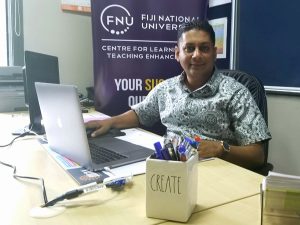
 As the national institution, Fiji National University (FNU) continues to provide high-quality education to all students through various modes of study.
As the national institution, Fiji National University (FNU) continues to provide high-quality education to all students through various modes of study.
Whilst our academic staff, resources and facilities ensure all students complete their studies at FNU fully capable and qualified, a method of study that also lends itself to a student’s academic success is peer to peer learning.
As learning and teaching evolve towards meeting the demands of the 21st century, modern learners are in greater need of additional support to complement their learning. They need a friend, a guide, a peer mentor who can provide friendly support in pursuit of their academic goals – and PAL does just that!
PAL – Peer Assisted Learning – is a free initiative implemented in 2019 through the University’s Centre for Learning and Teaching Enhancement (CLTE). The initiative is now fully institutionalised at the University, spanning across 11 campuses throughout Fiji, including regional and international students from countries that include Tonga, Solomon Islands, Vanuatu, Samoa, Kiribati, Afghanistan and New Zealand.
PAL Leaders are recruited based on their strong academic portfolios and are further trained and empowered to model and encourage effective and independent learning habits. Currently, PAL facilitation is at the helm of 96 dynamic and vibrant PAL Leaders.
The flexible mode of delivery of PAL through Zoom online sessions due to the current pandemic restrictions make PAL dynamic and ensures that PAL support reaches out to a large cohort of participants, including students who could not make it to Fiji due to the COVID-19 restrictions. With the current learning environment, students will need to draw on the various learning support they need in order to successfully complete their studies remotely and online. Having a peer support network they can turn to is an added advantage for these students.
Students believe that the key to participating in PAL sessions lies in the warm and friendly atmosphere created by PAL Leaders. PAL sessions are very popular with the student body here at FNU. The great thing about PAL is its inclusiveness, it can adapt to so many different disciplines and settings. I think it is extremely important to think of the PAL sessions as a peer-facilitated programme of study, where the students co-create their learning experience with their peers.
One of the benefits that we see is that when students attend weekly and attend as a programme of study, they get the most out of it. Other benefits include progressing well in their courses, enhanced relationships with their peers within the course, making connections with teachers in the course and students across the PAL programme. This leads to the development of a learning community that enhances the learning journey – the core of what we want PAL sessions to be.
We have seen different things happen in different courses. That’s the fantastic thing about working with lots of different disciplines and different colleges. We have already seen that PAL sessions are a springboard for other activities. We see PAL Leaders encourage extra activities outside of their scheduled sessions.
For instance, the students from the sessions often go to different workshops, student services or libraries, then return to the sessions and distribute the knowledge and skills learned from these activities. Anyone can benefit from PAL sessions. Our data shows that students who attended PAL sessions saw great benefits – whether it’s revising content, social engagement or explaining concepts, theories and ideas to other students. In a nutshell, PAL Leaders are there to facilitate learning as a relatable figure.
PAL Leaders think about what they learned when they were doing the course and how they can convey that message to their students more effectively. It’s about reframing those messages in a way that the students will understand Our resilient PAL Leaders also do not seem to be deterred by the setbacks they encounter, whether it be looking for suitable venues, encouraging student participation and involvement, rescheduling PAL sessions, encountering demanding students or other unforeseeable obstacles.
Dr Deepak Prasad
Associate Dean Learning and Teaching Enhancement
Centre for Learning and Teaching Enhancement